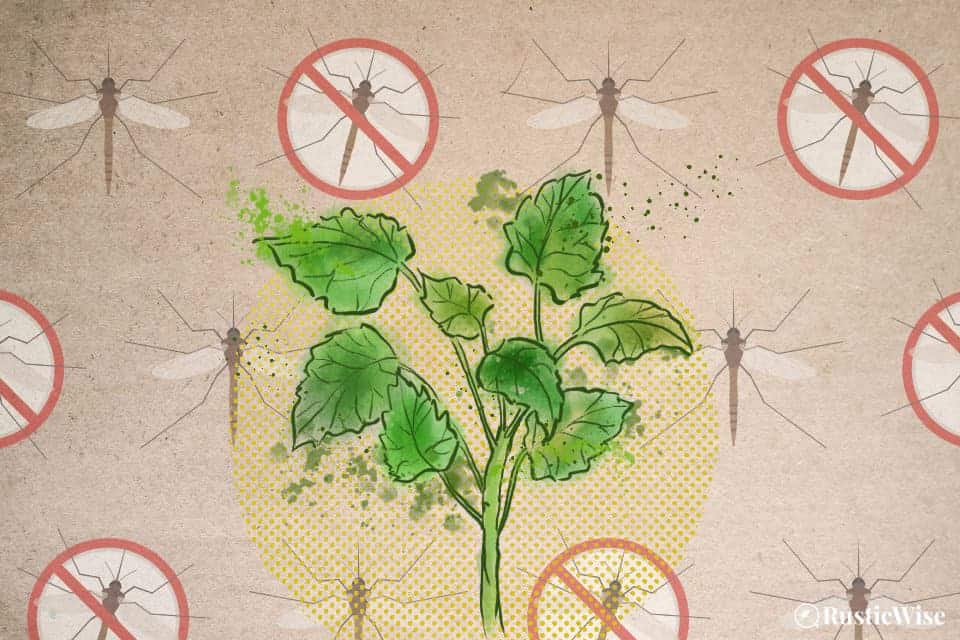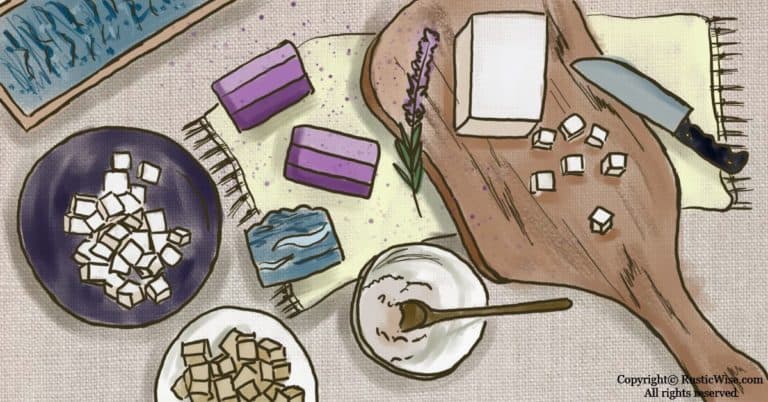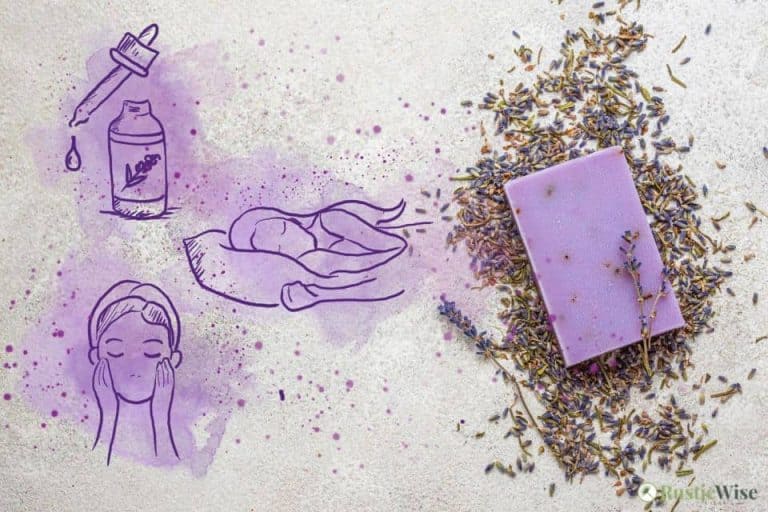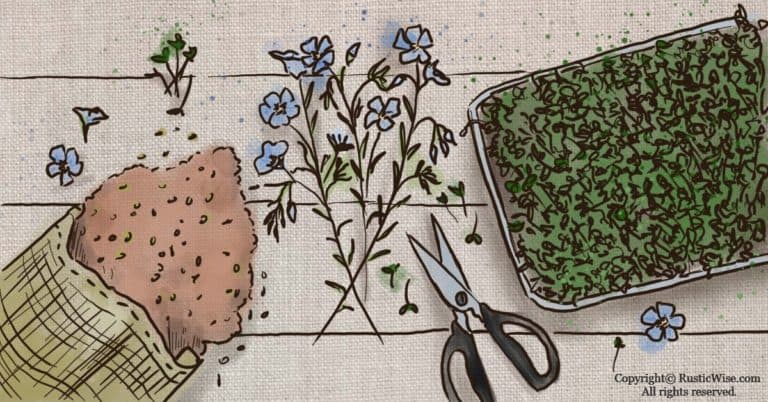Does Lemon Balm Repel Mosquitoes? Here’s a DIY Roll-on Bug Repellent
RusticWise is supported by its readers. When you purchase through links on our site, we may earn an affiliate commission. As an Amazon Associate, we earn from qualifying purchases. Thank You!
Most of us own a bottle or two of commercial insect repellent. But if you’re concerned about using DEET and other chemicals, you might be tempted to look into natural ways to repel those little buggers.
With mosquito season in full swing, it’s comforting to know that nature offers an effective mosquito repellent plant: lemon balm.
You might wonder, does lemon balm repel mosquitoes, really? Simply put, yes, it works if the oils are applied to the skin. The key to this herb’s effectiveness lies in the oils within the leaves. The plant oils contain various compounds, mainly citronellal. The next time you want a natural mosquito control method, pick a few leaves from the plant, crush them to release the oils, and apply onto skin.
Let’s take a closer look at properties of the Melissa officinalis plant. Plus, I’ll show you how to make an easy DIY roll-on lemon balm mosquito repellent.
What is lemon balm, exactly?
Lemon balm (Melissa officinalis) is a perennial herb belonging to the mint family. It also goes by other names including common balm, sweet balm, bee balm, and balm gentle.
With its distinct citrus aroma and lemony flavor, it’s a popular aromatic culinary herb used to flavor soups, salads, desserts, beverages, and used as a garnish. Use it raw or cooked.
While lemon balm grows natively in southern Europe (the Mediterranean) and Central Asia, you can find it growing in many temperate regions around the world.¹
This aromatic herb has wrinkly, fragrant leaves with tiny hairs. It can grow up to 2 feet tall and is a popular border plant. When in bloom, it produces tiny clusters of white, light yellow, or pale purple flowers.¹
Another reason to grow this plant in your garden—bees, plus other pollinators and beneficial insects love it!
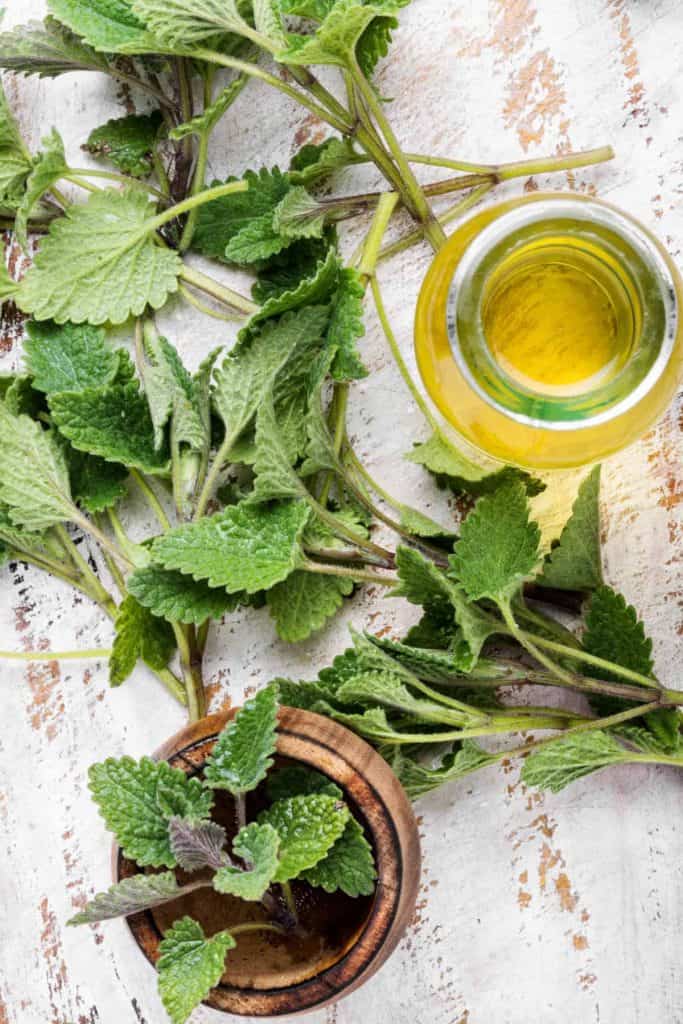
Does lemon balm repel mosquitoes? Here’s what you should know
The released oils from lemon balm along with the citrus fragrance act as a natural and useful insect repellent. Many insects, including pesky mosquitoes, have an aversion to this scent.
So while the plant itself produces a fragrant lemony scent, having the mosquito repelling plant in your vicinity isn’t enough to keep bugs at bay. If you have a potted common balm plant on your doorstep or deck, you may still have mosquitoes nipping your ankles. (And sadly, a mosquito bite or two as a result!)
You’ll need to pick a few fresh leaves from the lemon balm plant, gently crush the leaves to release the oils, and rub directly onto your skin.
Keep in mind that you will need to reapply more often, as this natural repellent doesn’t last as long as chemical-based sprays.
For example, inspect sprays which contain 10 percent DEET may provide roughly 2 hours of protection. Those with higher concentrations of DEET between 20 and 30 percent may last around 5 hours.²
Plant-based oils such as that from lemon balm may provide 2 hours of protection or less.
Tip: While natural insect repelling plants such as lemon balm provide mild protection, it won’t provide the same longevity or high level of coverage as commercial sprays. So use your natural plant-based mosquito for those times when you need moderate coverage.
How does lemon balm repel mosquitoes?
Add lemon balm to the list of plants that keep mosquitoes at bay, which includes basil, lemongrass (aka citronella grass), lemon thyme, lemon eucalyptus, and lavender.
The secret to lemon balm’s effectiveness lies in the oils released from the plant, in particular the leaves.
Let’s take a look at the essential oils from the Melissa officinalis plant.
It comprises various compounds including:³
- Geraniol
- Citronellol
- Citronellal
- Linalool
- Eugenol acetate
- Nerol
The lemon balm plant contains high levels of citronellol and citronellal.
If the terms “citronellol” and “citronellal” sound familiar, it’s because these compounds are the lemon-scented components present in many natural repellent oils. You can find them in citronella oil which comes from the citronella plant (also known as citronella grass). These compounds are used to add scent to various products, from soap to beverages.
Geraniol and nerol are isomers of the lemony-scented compound citral.¹
Don’t be fooled by the marketing claims of the mosquito plant
You may have heard of the mosquito plant, also known as the citrosa plant, or citronella geranium. While this plant is hailed as a miracle plant that repels insects, it falls short in its effectiveness.
According to Iowa State University, many varieties of the mosquito plant only contain 0.09 percent citronellal.⁴ Lemon balm contains up to 38 percent citronellal—an increase by a factor of roughly 400!
Lemon balm safety
As with any new substance, natural or otherwise, it’s wise to use with caution. Those with sensitive skin may experience skin irritation from the volatile oils.
While lemon balm is generally safe for most people, it’s a good idea to do a quick patch test on your forearm before you liberally apply it over your skin.
Using lemon balm leaves to repel bugs (lemon balm plant mosquito repellent)
Using lemon balm leaves as a natural way to deter mosquitoes is as easy as picking a few fresh leaves from the plant, and gently crushing them. When crushed and crumpled, the leaves release volatile oils that emit a strong scent of citrus (with a hint of mint) which drives mosquitoes away.
Rub the crushed leaves onto your skin. The oils spread easily. Focus on vulnerable areas such as the ankles, neck, arms, and legs.
Not only does the pleasant aroma of citrus repel mosquitoes, it also keeps gnats at bay.
Tip: This natural remedy lasts as long as the scent remains. If you no longer smell like lemon, it’s time to reapply!
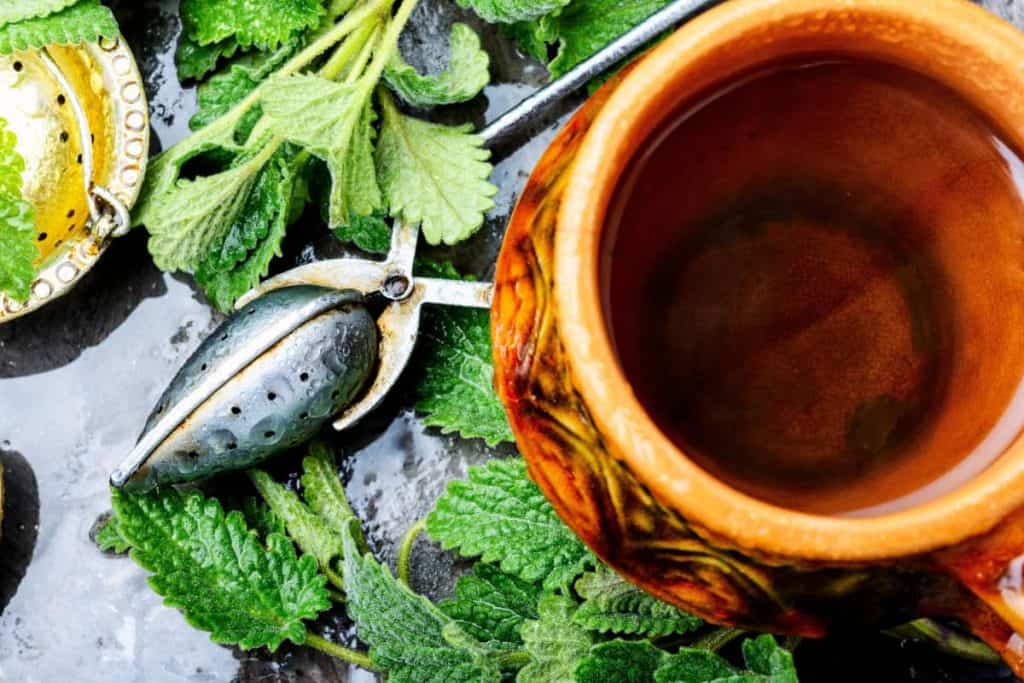
Lemon balm benefits and uses
Besides keeping insects away and acting as a natural mosquito repellent when its oils are released, lemon balm is a handy herb to grow in your garden. You can use this herb fresh or dried. Nothing beats fresh, however, as the lemony compounds quickly dissipate once dried.
Here are a few common uses of this fragrant herb:
- Aromatherapy: The essential oils have calming and uplifting properties that help ease nervous tension.⁵
- Culinary herb: Impart your culinary creations with a fresh citrus scent and a herbaceous taste. Add common balm to salads, sauces, soups. It’s also a great addition to desserts and other sweets.
- Flavor beverages: Brighten up beverages including wine, liqueur, and juice. Brew a soothing cup of herbal lemon tea.
- Medicinal purposes: The oils of this plant have antiviral, antibacterial, and antispasmodic properties. This healing herb has long been used as a traditional remedy to promote better sleep and digestion. It can be applied topically to treat cold sores and insect bites.⁵
Growing lemon balm in your garden
While the idea of having a natural mosquito repellent in your backyard sounds appealing, lemon balm’s tendency to spread easily turns some people off.
An easy solution is to contain this plant in a pot and place it in strategic areas such as your deck, front and back doors, where you can easily access fresh leaves and their scented oils.
Grown as either a perennial or an annual, this aromatic plant does best in full sun, but does fine in partial shade. It likes deep, well-draining soil with a pH between 4.5 to 7.8.³
Keep moist, but avoid over-watering. During its first year, harvest once while it flowers. In subsequent years, you can harvest two or three times.³
It’s hardy in USDA regions 4 to 8 and dislikes the cold.⁵
While growing outdoors, lemon balm is said to repel flies, gnats, and ants.⁵
You might like
100% Pure & Natural Melissa Essential Oil Therapeutic Grade
- Tested for safety and quality: The lemon balm essential oil is rigorously tested by GC/MS, MSDS, COA, IFRA, etc. Do not use undiluted on pets, children and during pregnancy.
- Pure and natural: Steam distilled from from the finest Slovenian lemon balm buds. The result is 100% pure, undiluted Melissa oil that is therapeutic-grade.
Found on Amazon
Check Current Price
Those in Canada and the UK should be taken to the product listing in your region.
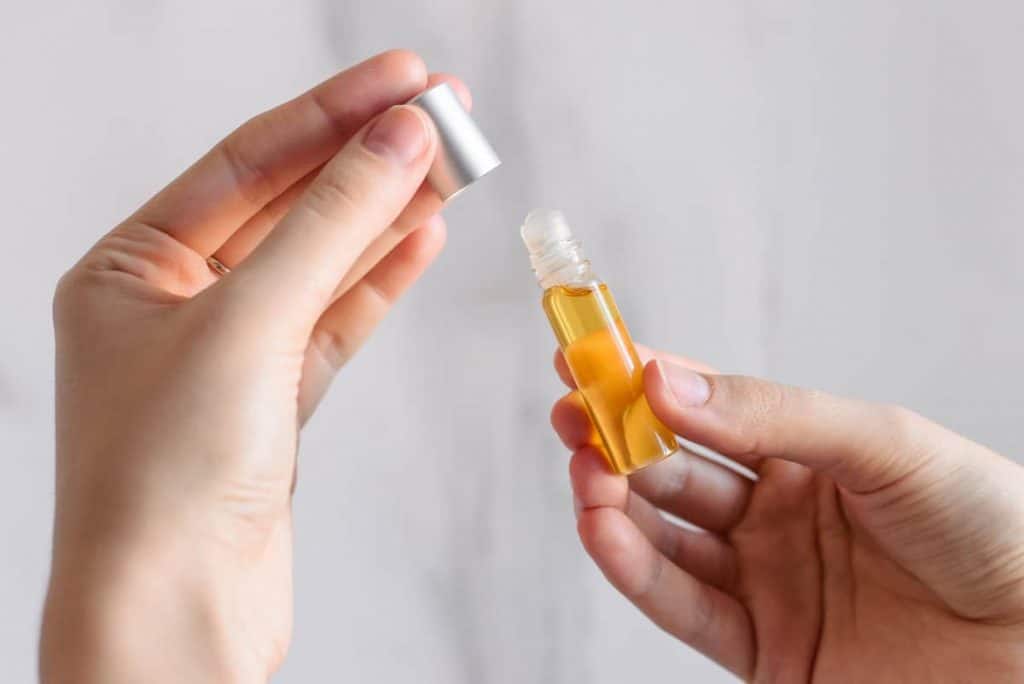
How to make your own lemon balm mosquito repellent
If you’re looking for an easy, natural way to keep those skeeters at bay, here’s how you can make your own DIY bug repellent using the essential oil of lemon balm.
This lemon balm mosquito repellent recipe is great if you don’t want to deal with a homemade bug spray and prefer to apply bug repellent via a roll-on bottle. Stash it in your pocket or purse and reapply as necessary.
When selecting your carrier oil, it’s best to use a type of liquid oil that absorbs easily onto skin. Sunflower seed oil, jojoba oil, and olive oil work well, but you can substitute with another carrier oil.
Safety note: It’s important to remember that essential oils are potent. While a few drops don’t sound like a lot, don’t overdo it! The following recipe uses 10 drops of essential oil, which is roughly a 5 percent concentration in a 10 mL bottle.
Yield: 1-10 milliliter roll-on bottle
Supplies you’ll need:
- Empty roll-on bottle (10 milliliters)
Ingredients:
- 10 drops of lemon balm essential oil (you could do half lemon balm, and half lavender essential oil, which also has insect repellent properties)
- Carrier oil (sunflower seed oil, jojoba oil, or olive oil works well)
- Add essential oils directly to the glass roll-on bottle.
- Fill the rest of the bottle with a carrier oil of your choice.
- Add the top. Gently roll the bottle in your hands to mix.
- Don’t forget to label your bottle!
Other citrus herbs that keep mosquitos away
Other lemony herbs with purported mosquito repellent properties include:
- Lemon thyme
- Lemon grass
- Citronella plant (a type of scented geranium), or citronella grass
- Lemon eucalyptus
- Lemon verbena
Related questions
What’s the best way to keep mosquitos away in your yard?
One of the most effective methods to keep mosquitos away is to eliminate any standing water in the area, as mosquitos breed in stagnant water. You may find mosquito larvae in damp areas. If you regularly empty any outdoor containers, such as bird baths or flower pots that collect water, you’ll have fewer pesky skeeters nearby!
What does lemon balm repel?
Besides repelling mosquitoes, lemon balm oil repels bugs such as ants, flies, and gnats in the garden.
Do dryer sheets repel mosquitoes?
Keeping a dryer sheet in your pocket and rubbing it onto your ankles and wrists has long been a gardening hack to keep bugs at bay. The thinking goes that dryer sheets can repel mosquitoes due to the strong scent they emit. But does this really work? To my knowledge, there is little scientific evidence to support this claim. While some people swear by using dryer sheets as a mosquito repellent, others have found it to be ineffective. Some dryer sheets contain citronellol which might explain why it may (or may not) work. Best to keep yourself covered up!
Would you like more timeless tips via email?
Fun tips to help you live an independent, self-sustaining lifestyle. Opt-out at any time.


References
- Britannica, Lemon balm, https://www.britannica.com/plant/lemon-balm. Accessed May 2023.
- Cleveland Clinic, Is DEET Bad for You (and Your Kids)?, https://health.clevelandclinic.org/is-deet-bad-for-you-and-your-kids/. Accessed May 2023.
- Purdue University, Lemon Balm, https://hort.purdue.edu/newcrop/med-aro/factsheets/LEMON_BALM.html. Accessed May 2023.
- Iowa State University, Mosquito Repellent Plants, https://hortnews.extension.iastate.edu/1993/5-26-1993/plant.html. Accessed May 2023.
- Plants for a Future, Melissa officinalis – L., https://pfaf.org/user/plant.aspx?latinname=Melissa+officinalis. Accessed May 2023.

Author: Josh Tesolin
Josh is co-founder of RusticWise. When he’s not tinkering in the garden, or fixing something around the house, you can find him working on a vast array of random side projects.

